Life Sciences News
See our Latest Journal Publications
SLS alumnus raises awareness of the homeless
James Beavis, a former Biomedical Science student who gradated in 2016, spent his Christmas sleeping rough on the streets of London. His aim was to raise money for and to try to better understand the homeless community.
Read about his life on the streets in the Guardian: 'Spat on and ignored': what I've learned from a month sleeping rough in London
Free Public Science evening on 7 February 2017: 'Keeping plant disease at bay'
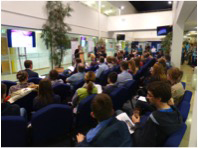 The School of Life Sciences is proud to host a free Public Science event, 'The Elizabeth Creak Charitable Trust Food Security Lecture - Keeping plant disease at bay’ on Tuesday 7 February 2017.
The School of Life Sciences is proud to host a free Public Science event, 'The Elizabeth Creak Charitable Trust Food Security Lecture - Keeping plant disease at bay’ on Tuesday 7 February 2017.
Our ability to grow plants productively is under severe and increasing threat from climate change. Increasing global temperatures could decrease the amount of food on our shelves, leading to global food shortages of our favourite products such as beans. These rising temperatures may also lead to the spread of harmful plant diseases that destroy our crops and threaten farmers’ livelihoods. Discover how our research, which covers weeds and crops through to trees and even includes bananas, strives to understand and mitigate these threats to ensure that we can feed ourselves in the future. Interesting demonstrations and talks will explain how we keep our food secure via pest management, pollinators, and whole plant imaging.
The evening will be hosted by Professor Murray Grant who took up the role of Elizabeth Creak Chair in Food Security in June 2016. Professor Grant’s post has been funded by The Elizabeth Creak Charitable Trust, which was established in memory of Elizabeth Creak - a highly capable and well respected farmer who brought many creative ideas to the world of farming.
Professor Murray Grant, said
“Warwick Crop Centre based at Wellesbourne, close to the original farm of Elizabeth Creak, provides the unique ability for translating findings from the lab into the field.”
Registration to attend the event is now open. All are welcome, and we are especially keen to see alumni and members of the local community attend. This event follows on from our previous highly successful Public Science events ‘A healthy brain for a healthy life’, ‘Getting to grips with antibiotic resistance’ and ‘The Fly Room’. This event is free to attend and will start at 18:00 and end at 20:00.
Ash dieback: Insect threat to fungus-resistant trees
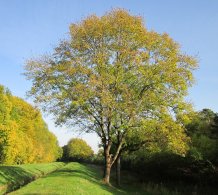 Ash trees which can resist the killer dieback fungus may be more vulnerable to attacks by insects, according to new research.
Ash trees which can resist the killer dieback fungus may be more vulnerable to attacks by insects, according to new research.
Scientists from the universities of Exeter and Warwick examined trees which are resistant to ash dieback and – unexpectedly – found they had very low levels of chemicals which defend against insects.
With efforts under way to protect ash trees from dieback, the scientists warn that selecting trees for fungal resistance could put them at risk from insects.
Deadly sleeping sickness set to be eliminated in six years
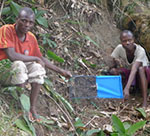 Gambian sleeping sickness – a deadly parasitic disease spread by tsetse flies - could be eliminated in six years in key regions in the Democratic Republic of Congo (DRC), according to new research by the University of Warwick.
Gambian sleeping sickness – a deadly parasitic disease spread by tsetse flies - could be eliminated in six years in key regions in the Democratic Republic of Congo (DRC), according to new research by the University of Warwick.
Kat Rock and Matt Keeling at the School of Life Sciences, with colleagues in DRC and the Liverpool School of Tropical Medicine, have calculated the impact of different intervention strategies on the population dynamics of tsetse flies and humans - establishing which strategies show the most promise to control and eliminate the disease.
Christmas dinner saved! Sprouts gain natural disease defence
 Professor John Walsh’s group at the School of Life Sciences, Wellesbourne campus, has discovered natural plant genes that will make sprouts resistant to two of the biggest threats they face: Turnip mosaic virus and Turnip yellows virus.
Professor John Walsh’s group at the School of Life Sciences, Wellesbourne campus, has discovered natural plant genes that will make sprouts resistant to two of the biggest threats they face: Turnip mosaic virus and Turnip yellows virus.
Devastating elephantiasis disease facing elimination
A disabling parasitic disease which causes elephantiasis, and threatens around one billion people globally - Lymphatic filariasis - could be eliminated more quickly, thanks to research by the University of Warwick.
Dr Deirdre Hollingsworth, a member of the School of Life Sciences, who leads the Neglected Tropical Diseases (NTD) Modelling Consortium, led an international team that has discovered that if a recently proposed combination of three particular drugs is used together, the disease can be prevented or treated rapidly, in a maximum amount of people, using fewer rounds of drugs.
Public Science event: 'The Fly Room'
On the afternoon of Friday 25 November 2016, Professor Kevin Moffat led a Public Science screening of the critically acclaimed arthouse film ‘The Fly Room’. This film centered around the famous Fly Room at the University of Columbia, run by Dr Thomas Hunt Morgan. It was here that the basic laws that govern heritability and the passing of traits were discovered – work that would eventually win their lab a Nobel Prize in 1933 and formed the foundation of the genetic discoveries that continue today. The focus of the film was on Dr Calvin Bridges and his daughter Betsy, and how their relationship evolved after a father-daughter visit to the lab. This film mixed science and arts in an attempt to not only engage the audience with the scientific story of genetics but also the social story about the relationship between a father and daughter.
After the film showing a Q&A with the director Alexis Gambis was held. Following that, a poster discussion about current Drosophila research from various West Midlands genetics researchers took place.
Feedback from local residents and attendees was incredibly positive with many approving of the film:
‘Beautiful and intriguing. I loved the interplay between past and present, memories, dreams and reality’
'Beautifully filmed piece on the analysis between relationships and science, with a great non-linear narrative’
‘Very engaging I loved the photography and the portrayal of characters and their relationships. Great alternative to a factual lecture in a sterile environment. The music score was great and enhanced the film, especially it’s gentle background presence. This film is a very effective medium to deliver a message, a story and idea. People enjoy stories’
‘Showing a film about science and relationships to an audience of scientists and non-scientists, the duality was there for the viewers as in the film. This is the best way to communicate science to the community’
Why not come to one of our future public science events? For details visit www.warwick.ac.uk/lifesci/outreach/publicscievents
Warwick and Waitrose tackle global food security together
Food security is at the heart of a new doctoral training collaboration between the University of Warwick and Waitrose, thanks to an award from the Biotechnology and Biological Sciences Research Council (BBSRC).
Warwick will work with Waitrose and their suppliers, to provide PhD students with a unique combination of academic development and industry training in the field of agriculture and sustainable crop production.
£1.1million funding for research into the structural basis of brain CO2-detection
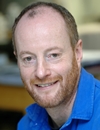 Professor Nick Dale has been awarded £1.1million from the MRC for his project ‘Structural and biophysical basis of Connexin26 channel mediated disease'. Dr Alex Cameron and Dr Corinne Smith are co-investigators.
Professor Nick Dale has been awarded £1.1million from the MRC for his project ‘Structural and biophysical basis of Connexin26 channel mediated disease'. Dr Alex Cameron and Dr Corinne Smith are co-investigators.
CO2 is the unavoidable by-product of metabolism and its regulated excretion via breathing is a key homeostatic process. The gap junction protein Connexin26 (Cx26) is an extremely important physiological sensor for CO2. This project will show how CO2 binds to Cx26 to gate channel opening thereby providing the structural underpinnings for one of the most important life preserving reflexes: the CO2-dependent regulation of breathing. Additionally, we will transform mechanistic understanding of how certain Cx26 mutations linked to human pathology alter CO2 binding. This new knowledge will impact across the many diverse fields of biomedical science where connexins, and in particular Cx26, have important roles in normal and abnormal (patho) physiological function in health and disease.
Clathrin: maintaining cell health in geometric style
Dr Corinne Smith, reader in structural biology and biophysics, was recently awarded a Royal Society Leverhulme Trust Senior Research Fellowship for her work on clathrin. To find out why Corinne is intrigued by clathrin read her post for the Royal Society of Biology at blog.rsb.org.uk/clathrin-maintaining-cell-health-in-geometric-style

Clathrin cage structures
(images from Kyle Morris and Corinne Smith)
Free film screening of The Fly Room on Friday 25 November
 On Friday 25 November, the School of Life Sciences has sponsored a free showing of the critically acclaimed arthouse film ‘The Fly Room’ in the Warwick Arts Centre Cinema. This film explores the relationship between a father and daughter as the father spends all of his time in ‘The Fly Room’, where is he responsible for the discovery of modern day genetics.
On Friday 25 November, the School of Life Sciences has sponsored a free showing of the critically acclaimed arthouse film ‘The Fly Room’ in the Warwick Arts Centre Cinema. This film explores the relationship between a father and daughter as the father spends all of his time in ‘The Fly Room’, where is he responsible for the discovery of modern day genetics.
This film has a very limited release and the director is coming especially over from the USA to do a Q&A at the end. If you would like to know more about the film please visit www.theflyroom.com
TICKETS ARE FREE.
Sign up to attend at www.warwick.ac.uk/giving/news/slsflyroom
New study identifies scope for more innovation in horticulture
A unique study has taken a thoughtful approach to understand why parts of the horticulture industry do not take up some of the innovative ideas that emerge from universities and research institutes, as well as other areas of the industry. The study has been undertaken by PhD student Jonathan Menary from Warwick Crop Centre, part of the School of Life Sciences.
Growers face headache over crop protection chemicals
Over-reliance on crop-protection chemicals has created a situation analogous to the growth of antibiotic resistance in human health says Dr Dave Chandler, researcher at Warwick Crop Centre.
Warwick School of Life Sciences - Funded PhD Opportunities
The School of Life Sciences combines the University of Warwick’s renowned research and teaching excellence to provide outstanding, diverse and multidisciplinary training in the Life Sciences. World-class facilities and internationally-recognised scientists develop pioneering research ideas and innovations in a wide range of disciplines – from the study of single molecules to models of entire ecosystems. We apply our expertise to solving major global challenges in areas such as food security, disease control, bioenergy, systems biology, neurobiology and climate change. The school has a number of funded postgraduate studentship opportunities to start in October 2017.
Synthetic Biology Centre for Doctoral Training (SynBioCDT) – 4 year studentships
This centre is a collaboration between the Universities of Warwick, Oxford and Bristol. We encourage PhD applications from students with a wide range of academic backgrounds, including Engineering, Biology, Biochemistry, Physics, Plant Sciences, Chemistry, Statistics, Mathematics and Computing.
Warwick SynBio CDT webpage
Application deadline Round 1: 18 November 2016
Application deadline Round 2: 13 January 2017
CENTA Doctoral Training Partnership – 3.5 year studentships
Central England NERC Training Alliance (CENTA) is a consortium of Universities and research institutes that are working together to provide excellence in doctoral research training in Environmental Science. PhD project themes include: Anthropogenic Impact and Environmental Sustainability, Evolution of Organisms and Ecosystems, Dynamic Earth, Organisms, ’omics and biogeochemistry
Warwick CENTA webpage
Application deadline 23 January 2017
Warwick Chancellor's International Scholarship – 3.5 year studentships
This competition is open to Overseas students. Scholarships will be awarded to the most outstanding international PhD applicants. Students are strongly encouraged to identify a supervisor and develop a research proposal before completing an application form. (see the website for a list of some possible PhD projects).
Application Deadline 18 January 2017
MIBTP Doctoral Training Partnership – 4 year studentships
The Midlands Integrative Biosciences Training Partnership (MIBTP) is a doctoral training partnership between the Universities of Warwick, Birmingham and Leicester. The MIBTP has an ambitious vision to deliver innovative, world class research across the Life Sciences to boost the growing Bioeconomy in the Midlands and across the UK.
PhD Studentship projects will be focussed in vital research areas such as food security, bio-energy and quantitative biology. Students from a wide diversity of academic backgrounds are encouraged to apply. Projects are available for those with creative drive in both theoretical (IT and mathematical) and experimental (biology, biomedicine, chemistry, biotechnology) research.
MIBTP website
Application deadline 8 January 2017
Industrial Collaboration PhD Studentships linked with MIBTP
These studentships are an excellent opportunity to initiate new industrial contacts, develop existing links and help enhance the impact of research. The BBSRC-funded iCASE studentships are designed to provide students with a first-rate challenging research training experience within the context of a mutually-beneficial research collaboration between academic and non-academic partner organisations.
MIBTP website
Behind-the-scenes access at Warwick’s life sciences labs
 Scientific laboratories at the University of Warwick are once again being opened up to members of the public – giving YOU behind-the-scenes access to cutting-edge research happening in Coventry.
Scientific laboratories at the University of Warwick are once again being opened up to members of the public – giving YOU behind-the-scenes access to cutting-edge research happening in Coventry.
Over the next year, the School of Life Sciences is running a series of open events, allowing the local community to come along and find out how the natural world works – from our superbrains to superbugs!
The next event, ‘Getting to grips with antibiotic resistance’, will explore the international threat of antimicrobial drug-resistant bacteria – which are predicted to kill more people than cancer by 2050.
Exploiting natural resistance to Turnip yellows virus in oilseed rape
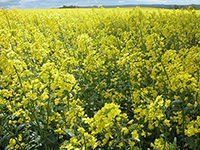 Dr Max Newbert and Professor John Walsh have prepared videos on the outcomes of their BBSRC Crop Improvement Research Club (CIRC) project on exploiting sources of plant virus resistance for deployment in oilseed rape. Dr Graham Teakle and Dr Guy Barker were project co-investigators and Dr Adam Baker was the PDRA. Sources of resistance were identified in oilseed rape and lines of the diploid progenitors of oilseed rape; QTLs associated with the three resistance sources have been mapped. All three resistances have been shown to be effective against viral isolates representing the different genetic groups of the virus. The diversity of the virus across Europe has been investigated with 179 whole genomes sequenced, detailed phylogenetic analyses performed, new weed hosts identified and a full-length infectious clone of the virus generated.
Dr Max Newbert and Professor John Walsh have prepared videos on the outcomes of their BBSRC Crop Improvement Research Club (CIRC) project on exploiting sources of plant virus resistance for deployment in oilseed rape. Dr Graham Teakle and Dr Guy Barker were project co-investigators and Dr Adam Baker was the PDRA. Sources of resistance were identified in oilseed rape and lines of the diploid progenitors of oilseed rape; QTLs associated with the three resistance sources have been mapped. All three resistances have been shown to be effective against viral isolates representing the different genetic groups of the virus. The diversity of the virus across Europe has been investigated with 179 whole genomes sequenced, detailed phylogenetic analyses performed, new weed hosts identified and a full-length infectious clone of the virus generated.
- Video for the general public:
Developing crops with natural resistance to plant diseases - Video for potential partners who would be interested in exploiting the resistances for deployment in commercial crops:
Identifying, mapping and exploiting natural resistance to Turnip yellows virus in oilseed rape and other brassicas
The videos were funded by BBSRC’s Impact Acceleration Account (IAA) grant to Warwick Ventures which also funded Max as an Impact Fellow supervised by Suzy Wood.
Exploring brain research at Warwick
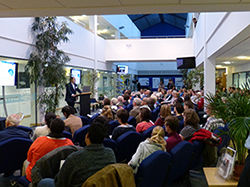 On the evening of Tuesday 11 October Professor Nick Dale organised a public science event devoted to the human brain.
On the evening of Tuesday 11 October Professor Nick Dale organised a public science event devoted to the human brain.
Members of the public were given the chance to find out about the cutting-edge neuroscience research taking place at the University of Warwick. Researchers gave demonstrations of science in action and tours of our laboratories. The event, ‘A healthy brain for a healthy life’, gave visitors the opportunity to find out how we can keep our brains in shape as we get older and how to put things right when the brain goes wrong.
There was also a demonstration of how our sense of self can be tricked into adopting inanimate objects, and a Q&A session where people found out about all those brain queries they wanted to know but were too afraid to ask!
If you missed this opportunity to visit the School of Life Sciences, other events will be running throughout the year including:
- Getting to Grips with antibiotic resistance
- Food Security – keeping plant pathogens at bay
- The Microbiome
- Films and Science
SLS Online Open Day
Our brand new Online Open Day has just gone live. It has been designed to help prospective students discover more about studying here. Current students and staff talk about courses, support for study and the student experience.
Have a look at http://4thwallmedia.co.uk/warwick-lifesciences/
Lameness treatment guidelines for sheep save UK farmers £700M
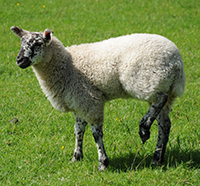 Evidence provided by researchers, led by Professor Laura Green from the School of Life Sciences, has helped cut the number of lame sheep in the UK national flock by half, saving the industry £700M over ten years and preventing 7.5 million sheep from becoming lame every year.
Evidence provided by researchers, led by Professor Laura Green from the School of Life Sciences, has helped cut the number of lame sheep in the UK national flock by half, saving the industry £700M over ten years and preventing 7.5 million sheep from becoming lame every year.
Read more about the BBSRC funded study
Your chance to explore science in the School of Life Sciences
Members of the public are to be given behind-the-scenes access to scientific laboratories at the University of Warwick, as well as the chance get to grips with cutting-edge research.
Over the next year, the School of Life Sciences will be running open events, allowing people of all ages to come along and find out how the natural world works – from the human brain, to antibiotics and climate change.
Researchers and staff will give live demonstrations of science in action and tours of working laboratories, and they’ll be on hand to answer your questions.
The first event, ‘A healthy brain for a healthy life’, will be devoted to exploring our amazing brains.
